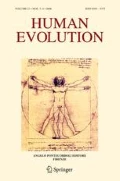Abstract
Sociobiological explanation of altruism, through theories as such «kin selection», cannot reach the wealth of human morality; it is necessary to add some specific traits in order to explain the human way to ultrasociability. Some of them appear within the classical school of «moral sense», distinguishing between two different levels («motive to act» and «moral criterion») of moral phenomenon. Due to the complexity of criterion level, here we deal with a broad model of human moral phenomenon, proposing three different dominions («motive to act», «personal criterion», «collective values»), and trying to find possible phylogenetic roots of them through a cognitive approach.
Similar content being viewed by others
References
Alexander R.D., 1979.Darwinism and Human Affairs. Seattle, Wa., University of Washington Press.
Alexander R.D., 1987.The biology of moral systems. N.Y., Aldine De Gruyter.
Bertram B.C.R., 1982.Problems with altruism. In: King's College Sociobiology Group, ed. Current Problems in Sociobiology, pp. 251–267.
Bischof N., 1978.On the philogeny of human morality. In: Stent G.S., ed., Morality as a Biological Phenomenon. Berkeley, Cal., University of California Press, pp. 48–66.
Boehm C., 1982.The evolutionary development of morality as an effect of dominance behavior and conflict interference. J. Social Biol. Struct. 5: 413–421.
Bridgeman D.L., 1983.Benevolent Babies: Emergence of the Social Self. In: Bridgeman D.L. ed., The Nature of Prosocial Development, New York, N.Y., Academic Press, pp. 95–112.
Campbell D.T., 1975.On the Conflicts, between Biological and Social Evolution and between psychology and Moral Tradition. American Psychologist, 30: 1103–1126.
Campbell D.T., 1983.The Two Distinct Routes beyond, Kin Selection to Ultrasociality: Implications for the Humanities and Social Sciences. In: Bridgeman D.L. ed., Thernature of Prosocial Development, N.Y., Academic Press, pp 11–41.
Castrodeza C., 1988Ortodoxia darwinista y progreso biologico, M., Alianza Editorial.
Cela-Conde C.J., 1987.On Gods, Genes and Tyrants. Dordrecht, Reidel.
Crook J.H., 1980.The Evolution of Human Consciousness, Oxford, Clarendon Press.
Danielli J.F., 1980.Altruism and the internal reward system or the opium of the people. J. Social. Biol. Struct., 3: 87–94.
Darlington Jr., P.J., 1978.Altruism: Its characteristics, and evolution. Proc. Natl. Acad. Sci. USA, 75: 385–389.
De Waal F., 1982.Chimpanzee politics: power and sex among apes N.Y., Harper & Row.
Goodall J., 1971.In the Shadow of Man. London, Collins.
Hamilton, 1964.The genetical evolution of social behavior. J. Theoret. Biol., 7: 1–52.
Hill J., 1978.The origin of sociocultural evolution. J. Social Biol. Struct., 1: 377–386.
Hill J., 1984Human altruism and sociocultural fitness. J. Social Biol. Struct., 7: 17–35.
Hoebel B.O., 1983.The neural and chemical basis of reward. In: Gruter M. & Bohannan P., eds. Law, Biology and Culture. Sta. Barbara, Cal., pp. 111–128.
Johanson D.C. &White T.D., 1979.A Systematic Assessment of early African Hominids. Science, 203: 322–333.
Keith A., 1947.Evolution and ethics. N.Y., Putnam's Sons.
Krebs D., 1970Altruism. An examination of the concept and a review of the literature. Psychol. Bull., 73: 258–302.
Kort F., 1983.An evolutionary-neurobiological explanation of political behavior and the Lumsden-Wilson «Thousand-year rule» J. Social. Biol. Struct., 6: 219–230.
Lindsay P.H. &Norman D.A., 1977.Human Information Processing. N.Y., Academic Press.
Lorenz K., 1941.Kant's Lehre von Apriorischen im Lichte gegenwärtiger Biologie. Blatt für Deutsche Philosophie, 15: 94–125.
Lumsden C.J. &Wilson E.O., 1981.Genes, Mind and Culture. The Coevolutionary Process. Cambridge, Mass, Harvard University Press.
Lumsden C.J. &Wilson E.O., 1983.Promethean Fire. Cambridge, Mass, Harvard University Press.
Mandler G. 1984.Mind and Body: Psychology of Emotions and Stress, N.Y., Norton.
Mandler G., 1985.Cognitive Psychology: An Essay in Cognitive Science. Hillsdale, N.J., Erlbaum.
Manier E., 1978.The Young Darwin and His Cultural Circle. Dordrecht, Reidel.
Marty G., 1987,Psicología dela memoria. Palma de Mallorca, I.C.E..
Maxwell M., 1984.Human Evolution. A philosophical anthropology London, Croom Helm.
Murphy J.G., 1982.Evolution, Morality and the Meaning of, Life. Totowa, N.J., Rowman & Littlefield.
Richards R.J., 1987.Darwin and the emergence of evolutionary theories of mind and behavior. The University of Chicago Press.
Science for the People, 1977.Biology as a Social Weapon. Minneapolis, Minn, Burgess.
Smith J.M., 1976.Evolution and the theory of games. American Scientist, 64: 41–55.
Stent G.S., 1977.The Poverty of Scientism and the promise of Structuralist Ethics. In: Engelhardt Jr., H.T. and Callahan D. eds. Knowledge, Value and Belief. Hastings-on-Hudson, Institute of Society, Ethics and the Life Science, pp. 225–246.
Stent G.S., 1978.Morality as a Biological Phenomenon. Berkeley, Cal., University of California Press.
Trivers R.L., 1971.The Evolution of Reciprocal Altruism. Quarterly Review of Biology, 46: 35–57.
Triver R.L., 1978.The Evolution of Cooperation. In: Bridgeman D.L. ed., The Nature of Prosocial Development. N.Y., Academic Press, pp. 43–69.
Tversky A. &Kahneman D., 1974.Judgement under Uncertainty. Science, 185: 1124–1131.
Quillian M.R., 1968.Semantic Memory. In: Minsky M. ed., Semantic Information Processing, Cambridge Mass., M.I.T. Press.
Voorzanger B., 1984.Altruism in Sociobiology: a Conceptual Analysis. Journal of Human Evolution, 13: 33–39.
Waddington C.H., 1941.The relations between science and ethics. Nature, 148: 270–274.
Wilson E.O., 1975.Sociobiology: the new synthesis. Cambridge, Mass., Harvard University Press.
Wynne-Edwards V.C., 1962.Animal Behaviour in Relation to Social Behaviour. Edinburgh, Oliver and Boyd.



